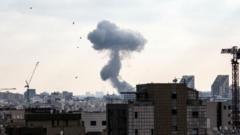The US is appealing to China to influence Iran's decision-making regarding the Strait of Hormuz, as tensions escalate following reported plans by Iran to potentially close this crucial maritime passageway.
US Urges China to Intervene with Iran to Keep Strait of Hormuz Open

US Urges China to Intervene with Iran to Keep Strait of Hormuz Open
Secretary of State Rubio emphasizes the economic repercussions of potential disruption in vital shipping route
The US Secretary of State has publicly urged China to take steps to prevent Iran from closing the Strait of Hormuz, a key waterway for global oil shipping. This statement came in response to reports from Iran's Press TV that claimed the Iranian parliament had approved plans to close the Strait, though the final decision would rest with the Supreme National Security Council.
Marco Rubio emphasized the importance of the Strait during an interview with Fox News, highlighting that a closure would not only have devastating effects on the global economy, but also on Iran itself. “If they close the Straits... it will be economic suicide for them,” he warned, noting the vital dependence of China, the largest buyer of Iranian oil, on this passage. Any disruption would lead to a spike in oil prices, which have already been affected by recent military actions against Iranian nuclear facilities.
The Strait of Hormuz is critical, with approximately 20% of the world's oil traffic flowing through it. An economic analysis indicated that operations disruption could dramatically increase oil costs, affecting not only energy prices but also the broader economy, including essential goods.
As reported, China imported over 1.8 million barrels of oil per day from Iran, making it vital for the Asian giant's energy security. Other nations, including India, Japan, and South Korea, also significantly depend on the oil routed through the Strait. Energy expert Vandana Hari remarked on Iran's precarious position, indicating that closing the Strait would alienate their neighboring oil producers and infuriate their principal market, China.
Adding complexity to the situation, the US has increased its military posture in the region following recent airstrikes on Iranian nuclear targets. While President Trump claimed these actions were significant, the extent of destruction inflicted remains uncertain. Iran has reported only minor impacts from these strikes, yet this escalatory dynamic could result in further conflict.
Following these developments, Beijing has expressed concerns regarding the US's actions, labeling them detrimental to Washington's credibility. China's UN Ambassador called for an immediate ceasefire, warning against further military escalation fueled by the current tensions in the region. In light of the latest interactions, analysts are closely observing how the dynamics between the US, Iran, and China will unfold in the days ahead.
Marco Rubio emphasized the importance of the Strait during an interview with Fox News, highlighting that a closure would not only have devastating effects on the global economy, but also on Iran itself. “If they close the Straits... it will be economic suicide for them,” he warned, noting the vital dependence of China, the largest buyer of Iranian oil, on this passage. Any disruption would lead to a spike in oil prices, which have already been affected by recent military actions against Iranian nuclear facilities.
The Strait of Hormuz is critical, with approximately 20% of the world's oil traffic flowing through it. An economic analysis indicated that operations disruption could dramatically increase oil costs, affecting not only energy prices but also the broader economy, including essential goods.
As reported, China imported over 1.8 million barrels of oil per day from Iran, making it vital for the Asian giant's energy security. Other nations, including India, Japan, and South Korea, also significantly depend on the oil routed through the Strait. Energy expert Vandana Hari remarked on Iran's precarious position, indicating that closing the Strait would alienate their neighboring oil producers and infuriate their principal market, China.
Adding complexity to the situation, the US has increased its military posture in the region following recent airstrikes on Iranian nuclear targets. While President Trump claimed these actions were significant, the extent of destruction inflicted remains uncertain. Iran has reported only minor impacts from these strikes, yet this escalatory dynamic could result in further conflict.
Following these developments, Beijing has expressed concerns regarding the US's actions, labeling them detrimental to Washington's credibility. China's UN Ambassador called for an immediate ceasefire, warning against further military escalation fueled by the current tensions in the region. In light of the latest interactions, analysts are closely observing how the dynamics between the US, Iran, and China will unfold in the days ahead.





















